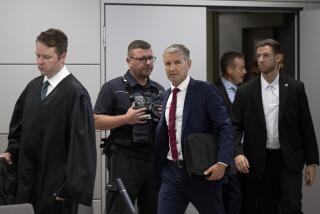Court reverses conviction in online rant against Obama
- Share via
A Southern California man who posted an online racist rant that suggested Barack Obama should be shot during the 2008 presidential campaign was engaged in constitutionally protected free speech and should not have faced criminal charges, a divided federal appeals court ruled Tuesday.
The decision overturns the conviction of Walter Bagdasarian of La Mesa, northeast of San Diego, who was found guilty two years ago by a federal judge in San Diego of violating a statute prohibiting threats to kill, kidnap or do bodily harm to a major presidential candidate.
Tuesday’s 2-1 ruling by a panel of the U.S. 9th Circuit Court of Appeals said that Bagdasarian’s vitriolic epithets were “particularly repugnant” because they endorsed violence. But the panel concluded that a reasonable person wouldn’t have taken seriously his diatribe in an online chat room at 1 a.m.
DOCUMENT: Read the court’s ruling
Bagdasarian, writing under the anonymous Internet identity of “Californiaradial,” posted the comments on a Yahoo.com financial site on Oct. 22, 2008, when Obama’s campaign for the White House was ascendant.
Another participant in the online exchange reported the provocative postings to law enforcement officials, leading to a Secret Service investigation and federal charges that could have sent the offender to prison for a decade.
Bagdasarian was sentenced to time served after a bench trial in 2009 and put on supervised release for two years, which included a prohibition against possessing firearms.
Among the comments he had posted was an observation that Obama “will have a 50 cal in the head soon” and that someone should “shoot the [racist slur].”
“There are many unstable individuals in this nation to whom assault weapons and other firearms are readily available, some of whom might believe that they were doing the nation a service were they to follow Bagdasarian’s commandment,” said the appeals panel opinion written by Judge Stephen Reinhardt. “There is nevertheless insufficient evidence that either statement constituted a threat or would be construed by a reasonable person as a genuine threat by Bagdasarian against Obama.”
The ruling noted that Bagdasarian did have in his possession .50-caliber weapons and ammunition but said the reference to a bullet in Obama’s head was “a prediction that conveyed no explicit or implicit threat on the part of Bagdasarian that he himself would kill or injure Obama.”
Bagdasarian, now 49, said he was drunk at the time he posted the comments.
The majority opinion written by Reinhardt and joined by Chief Judge Alex Kozinski also said Bagdasarian’s call to “shoot” Obama wasn’t an offense under the statute used to convict him because the law doesn’t criminalize “predictions or exhortations to others to injure or kill the president.”
Judge Kim McLane Wardlaw dissented in part, arguing that there was enough evidence to find him guilty of threatening harm.
With the Internet now a popular forum for political discourse, courts are increasingly called upon to relocate the moving boundary between protected speech and credible threats to political figures.
The 9th Circuit recently heard testimony in another case involving an Arizona man’s threats to shoot Super Bowl spectators in Phoenix eight years ago that were never carried out. The appeals court has yet to rule on whether the threat itself was a crime, even though it wasn’t committed.
Peter Scheer, executive director of the California First Amendment Coalition, said that he thought the majority “got it right” in interpreting Americans’ free speech protection but that the ruling “pushes it to the limit.”
“I only feel comfortable saying that having 20-20 hindsight in knowing that the threat wasn’t carried out,” Scheer said.
Debra Hartman, a spokeswoman for the U.S. attorney’s office in San Diego that brought the case against Bagdasarian, refused to comment on the case or the appeals court action.
Bagdasarian’s attorney, Ezekiel E. Cortez, declined to comment or make his client available to discuss the ruling.
More to Read
Sign up for Essential California
The most important California stories and recommendations in your inbox every morning.
You may occasionally receive promotional content from the Los Angeles Times.














